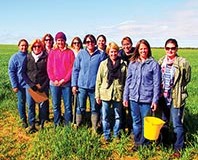Read the latest information on
Foot-and-mouth disease
 Women with little or no agricultural background who move into farm businesses often bring welcome new skills, but consultant Louise Flohr says many are keen to be more involved with their farming systems.
Women with little or no agricultural background who move into farm businesses often bring welcome new skills, but consultant Louise Flohr says many are keen to be more involved with their farming systems.
For the past three years, Ms Flohr, from Agrilink Agricultural Consultants, has been running workshops in South Australia to develop newcomers’ knowledge and practical skills.
The Grassroots Agronomy Workshops for Women in Farm Business include a series of field trips and crop walks, giving participants a better insight into all aspects of crop production – from sowing through to harvest and storage.
Ms Flohr has also recently teamed up with entomologists Judy Bellati and Helen de Graaf to include information on insect pest identification and improve the women’s understanding of biosecurity.
Topics covered in the workshops include crop species identification, the role of nitrogen in plant growth and budgeting, soil water availability, the use of tools such as soil moisture probes to aid decision-making, insect pest identification (in field and storage), frost identification and other factors affecting the current season.
Ms Flohr says it has made sense to include aspects of biosecurity in the basic agronomy workshops because biosecurity needs to be a fundamental part of farm activities.
“Pest identification is a great skill to learn because regular crop monitoring is essential for proactive farm management,” she says. “The more people on the farm who can identify common and unusual insects in broadacre crops and grain storage, the better.”
The one-day insect identification component consists of an interactive theory section and a practical hands-on session using microscopes. Participants learn about beneficial insects and pests, including exotic insect threats, grain storage principles and phosphine-resistant insects in stored grain.
Stored grain insect specimens from participants’ own farms are tested for phosphine-resistance levels so that they learn about the species in their own farm storages and the base-level resistance they have.
After the workshops, the participants are more confident about taking part in farm management and tracking the season’s progress. They also continue to learn by spending time in the field using the skills they developed.
“Participants take away some great resources from the workshops and know where to get further support services,” Ms Flohr says.
The Grassroots Agronomy Workshops for Women in Farm Business program is supported by Agrilink Agricultural Consultants and the South Australian Murray–Darling Basin Natural Resources Management Board.
Reproduced with permission from the Grains Research and Development Corporation